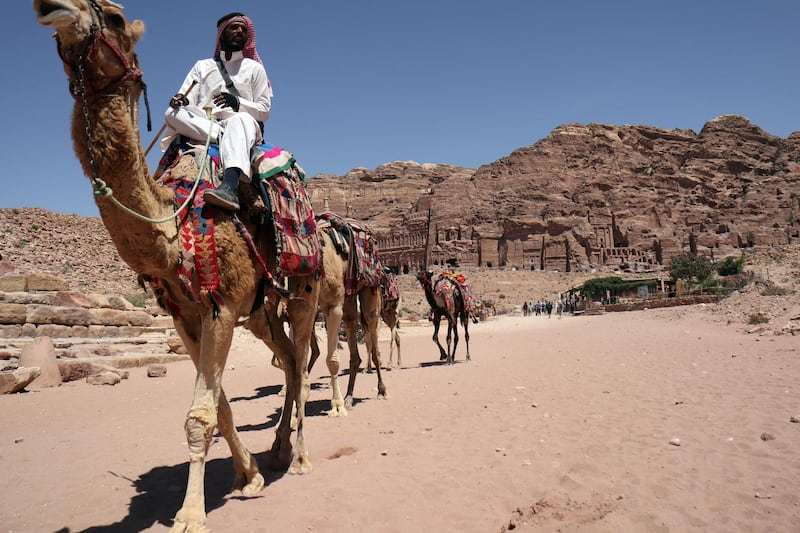Hundreds of mules, camels and horses plod daily along the hot, dusty trails in the ancient city of Petra, carrying visitors to the sights that make up Jordan's biggest tourist attraction.
The revenue is sorely needed by both the animals' owners and Jordan's struggling economy. But it has also attracted the attention of animal rights groups, which allege mistreatment.
Awad Suleiman, a 23-year-old Bedouin, has been for the past eight years providing mule rides leading up to the monastery, one of Petra’s major attractions.
While he says he cares for his two animals, he uses a stick to direct them and occasionally whips them.
“Sometimes when tourists are in a hurry and they want to catch the buses, I beat the animal so it can walk faster. Many times the mules walk fast and I don’t have to beat them,” he said.
“But I love my animals. I have two and each day I use a different one so that the other can rest.
“We do not torture them, and they are our livelihood. I spend 30 dinars (Dh155) a week on feeding them, much more than I spend on myself.”
Most Bedouins in Umm Sayhoun, a village overlooking Petra, depend on their animals to survive, but the treatment of donkeys, mules, horses and camels grabbed the attention of the animal rights group, People for the Ethical Treatment of Animals.
“More than 1,300 horses, donkeys, mules and camels are forced to carry tourists or pull carriages in the city every day, and they are suffering terribly,” Peta said, citing video footage.
“Handlers routinely whip and beat the animals as they haul tourists on a gruelling 10-kilometre trek in the sweltering heat, and there’s no water or shade for them.
“Visitors who choose to ride one of these animals are directly contributing to their pain and misery.”
However, poor locals do not believe they are mistreating the animals when they whip or beat them to move faster.
“There are people who think we beat them every day, but how can we hurt our camels and survive on them? It cost me 1,500 dinars to buy a camel,” said Hussein Hafeth.
Ghazi Mustafa, director of the Society for the Protection of Animals Abroad (Spana), said the mistreatment of animals in Petra was carried out mostly by children.
“It is part of the culture, since children are used to seeing their fathers holding sticks and whips when they ride their animals, but this should not be an excuse and child labour is not acceptable,” he said.
“We have been educating children about the welfare of animals, and we also reached out to community leaders who are well aware how the mistreatment of animals impacts tourism.
“But you still see locals carrying whips … such scenes are disturbing for the tourists. We still need to work more on raising awareness.”
Jordan’s ministry of tourism has responded to reports of animal abuse in the old city, saying it was an issue it is taking “seriously”.
“Cruelty to animals … is a crime punishable by law,” it said.
“The government has co-operated and continues to work with civil society organisations to raise awareness.
“We will follow up on the issues raised in the [Peta] report to ensure all violations are stopped.”
Jordanian law stipulates a fine of five dinars and seven days in prison for those found to be abusing animals. However, animal rights activists say the law is rarely enforced.
Suleiman Farajat, deputy chief commissioner of Petra Archaeological Park and Tourism, said Peta’s call for tourists to boycott the site was “not fair”.
“We do not deny that mistreatment of animals takes place, but they are individual cases committed by young people,” he said.
“It is not fair to ask tourist not to visit Petra. Rangers are at the site and report such cases, and we take action that includes paying fines or a jail sentence.”
Mr Farajat said his organisation is working on a strategy to raise awareness on animal welfare and on allocating special trails for the animals.
Tourism in Petra picked up last year after struggling since the Arab uprisings that swept across the Middle East in 2010. The number of visitors dropped from 800,000 in 2010 to 464,000 in 2016. Last year, the government recorded 620,000 tourists in Petra.
Banning the use of animals in Petra is unlikely at a time when poverty and unemployment rates are on the rise and after the government has adopted a slew of austerity measures and tax increases in recent months — angering the Bedouins, most of whom work in the tourism industry.
“We have asked officials to find us other jobs, but we are always told there are no vacancies,” said Haron Hammad, a camel handler.
“The [Peta] report is damaging to our business. We cannot deny that the practice is taking place, but not everyone is doing it and it is not acceptable.
“We do not have any jobs and therefore the kids resort to using animals for work. Things are not regulated.”
The Princess Alia Foundation, a non-governmental organisation to promote compassion towards animals, said it had partnered up with international and local establishments to improve the working conditions of donkeys and horses.
“I would like to underline that the Peta campaign was blown out of proportion, as there will be regrettable cases anywhere where there are hundreds of working animals, but the majority of horses are in overall good condition,” said Princess Alia.
“If Peta is indeed keen to help, we would welcome its assistance with experienced vets and, more importantly, experienced farriers to work on site.
“However, the negative publicity has been helpful in that it has underlined to those who do not behave the way they ought to that their actions have negative consequences, which can directly affect the tourism industry.”





